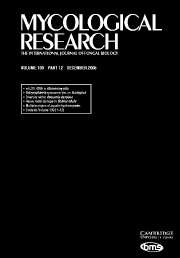Crossref Citations
This article has been cited by the following publications. This list is generated based on data provided by
Crossref.
Frazer, Lilyann Novak
1998.
One stop mycology.
Mycological Research,
Vol. 102,
Issue. 12,
p.
1571.
Judelson, Howard S.
and
Tooley, Paul W.
2000.
Enhanced Polymerase Chain Reaction Methods for Detecting and Quantifying Phytophthora infestans in Plants.
Phytopathology®,
Vol. 90,
Issue. 10,
p.
1112.
Ioos, R.
and
Frey, P.
2000.
Application de la variabilité génétique de l'ADNr chez Monilinia laxa, Monilinia fructigena et Monilinia fructicolaà l'identification des espèces par PCR*.
EPPO Bulletin,
Vol. 30,
Issue. 3-4,
p.
499.
Martin, Robert R.
James, Delano
and
Lévesque, C. André
2000.
Impacts of Molecular Diagnostic Technologies on Plant Disease Management.
Annual Review of Phytopathology,
Vol. 38,
Issue. 1,
p.
207.
Nechwatal
Schlenzig
Jung
Cooke
Duncan
and
Oßwald
2001.
A combination of baiting and PCR techniques for the detection of Phytophthora quercina and P. citricola in soil samples from oak stands.
Forest Pathology,
Vol. 31,
Issue. 2,
p.
85.
Dick, M. W.
2002.
Advances in Downy Mildew Research.
p.
1.
Tooley, P.W.
Carras, M.M.
Hatziloukas, E.
and
Scott, D.L.
2002.
Use of ligase chain reaction for enhanced detection ofPhytophthora infestans.
Canadian Journal of Plant Pathology,
Vol. 24,
Issue. 3,
p.
294.
Kong, P.
Hong, C. X.
and
Richardson, P. A.
2003.
Rapid detection of Phytophthora cinnamomi using PCR with primers derived from the Lpv putative storage protein genes.
Plant Pathology,
Vol. 52,
Issue. 6,
p.
681.
Schena, Leonardo
Nigro, Franco
Ippolito, Antonio
and
Gallitelli, Donato
2004.
Real-time quantitative PCR: a new technology to detect and study phytopathogenic and antagonistic fungi.
European Journal of Plant Pathology,
Vol. 110,
Issue. 9,
p.
893.
Feau, Nicolas
Weiland, Jerry E.
Stanosz, Glen R.
and
Bernier, Louis
2005.
Specific and sensitive PCR-based detection of Septoria musiva, S. populicola and S. populi the causes of leaf spot and stem canker on poplars.
Mycological Research,
Vol. 109,
Issue. 9,
p.
1015.
Schena, Leonardo
and
Cooke, David E.L.
2006.
Assessing the potential of regions of the nuclear and mitochondrial genome to develop a “molecular tool box” for the detection and characterization of Phytophthora species.
Journal of Microbiological Methods,
Vol. 67,
Issue. 1,
p.
70.
Narayanasamy, P.
2008.
Molecular Biology in Plant Pathogenesis and Disease Management.
p.
159.
Seo, Mun-Won
Song, Jeong-Young
and
Kim, Hong-Gi
2010.
Multi-locus Phylogeny Analysis of Korean Isolates of Phytophthora Species Based on Sequence of Ribosomal and Mitochondrial DNA.
The Korean Journal of Mycology,
Vol. 38,
Issue. 1,
p.
40.
Narayanasamy, P.
2011.
Microbial Plant Pathogens-Detection and Disease Diagnosis:.
p.
5.
Langrell, Stephen R.H.
Morel, Olivier
and
Robin, Cécile
2011.
Touchdown nested multiplex PCR detection of Phytophthora cinnamomi and P. cambivora from French and English chestnut grove soils.
Fungal Biology,
Vol. 115,
Issue. 7,
p.
672.
Sikora, Katarzyna
Verstappen, Els
Mendes, Odette
Schoen, Cor
Ristaino, Jean
and
Bonants, Peter
2012.
A Universal Microarray Detection Method for Identification of MultiplePhytophthoraspp. Using Padlock Probes.
Phytopathology®,
Vol. 102,
Issue. 6,
p.
635.
Martin, Frank N.
Abad, Z. Gloria
Balci, Yilmaz
and
Ivors, Kelly
2012.
Identification and Detection ofPhytophthora: Reviewing Our Progress, Identifying Our Needs.
Plant Disease,
Vol. 96,
Issue. 8,
p.
1080.
Dai, T.‐T.
Meng, J.
Dong, S.
Lu, C.‐C.
Ye, W.
Zheng, X.
and
Wang, Y.‐C.
2013.
A Phytophthora conserved transposon‐like DNA element as a potential target for soyabean root rot disease diagnosis.
Plant Pathology,
Vol. 62,
Issue. 3,
p.
719.
Pravi, V.
Jeeva, M. L.
and
Archana, P. V.
2014.
Rapid and Sensitive Detection of Sclerotium rolfsii Associated with Collar Rot Disease of Amorphophallus paeoniifolius by Species-Specific Polymerase Chain Reaction Assay.
Molecular Biotechnology,
Vol. 56,
Issue. 9,
p.
787.
Esh, Ayman M.H.
2014.
Biological Controls for Preventing Food Deterioration.
p.
341.


